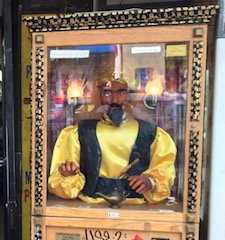 I’m ten weeks in on my TV news fast and I’ve dropped 50 pounds in psychic weight. No, I’m not living in a cave. I check the New York Times a couple of times a week (I even have a paid subscription), and I visit the BBC World News page for a more global perspective. Turns out there’s important stuff happening in other pars of the world. So I do get some news about American politics but now I’m controlling the spigot.
I’m ten weeks in on my TV news fast and I’ve dropped 50 pounds in psychic weight. No, I’m not living in a cave. I check the New York Times a couple of times a week (I even have a paid subscription), and I visit the BBC World News page for a more global perspective. Turns out there’s important stuff happening in other pars of the world. So I do get some news about American politics but now I’m controlling the spigot.
Early days for the new president but I’m wondering if it’s going to be as much fun as he thought. Time will tell. Of greater interest to me is to what extent Trump will become the new face of the Republican party. I’m sure this analogy has been worked hard because it’s so apt. After a night of Jägermeister shots the GOP wakes up to discover that dream about the tattoo parlor wasn’t a dream. Going to be hard to call yourself the Party of Reagan after a four year kegger at Sigma Tau Trump.
But who knows. That Trump tat might be good for free drinks for a long time. If so, party on! But if The Donald shits in the punch bowl, it’s gonna be hard to say it wasn’t his party.



 “A German company recently sparked controversy after launching a line of women’s underwear that it claims can protect the wearer against sexual assault. Called
“A German company recently sparked controversy after launching a line of women’s underwear that it claims can protect the wearer against sexual assault. Called  Since retiring, I’m occasionally asked if I’d consider working part-time. Uh, no. But this afternoon I thought of a job that I might find interesting. If such a job exists. If some company/business/service was doing one of those “is it human or is it a bot?” things, that might be fun. Sort of a half-assed Turing Test kind of thing? But I’d want total freedom in my responses.
Since retiring, I’m occasionally asked if I’d consider working part-time. Uh, no. But this afternoon I thought of a job that I might find interesting. If such a job exists. If some company/business/service was doing one of those “is it human or is it a bot?” things, that might be fun. Sort of a half-assed Turing Test kind of thing? But I’d want total freedom in my responses. I’m about halfway through
I’m about halfway through  According to Gleick, building the atomic bomb dramatically affected the lives of the scientists who created it. The Japanese lives lost to this terrible weapon have always been balanced against those that would have been lost in an invasion of Japan. Like my father, for instance. Japan surrenders, they turn the ships around and head home. Discharged March 9, 1946 in St. Louis. Meets and marries my mom (March 23, 1946) who was living in St. Louis. Happy ending. For some.
According to Gleick, building the atomic bomb dramatically affected the lives of the scientists who created it. The Japanese lives lost to this terrible weapon have always been balanced against those that would have been lost in an invasion of Japan. Like my father, for instance. Japan surrenders, they turn the ships around and head home. Discharged March 9, 1946 in St. Louis. Meets and marries my mom (March 23, 1946) who was living in St. Louis. Happy ending. For some.
